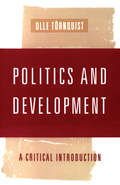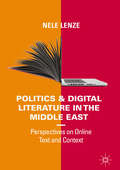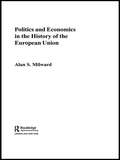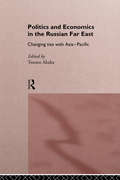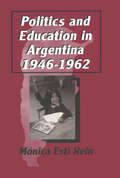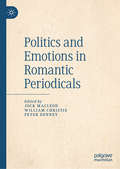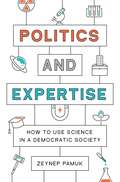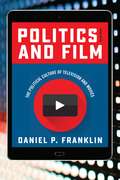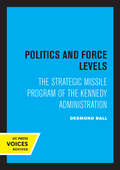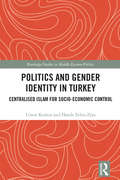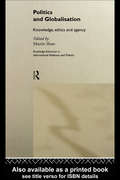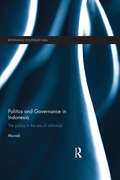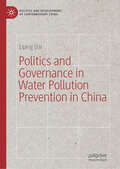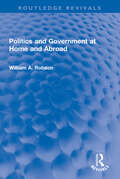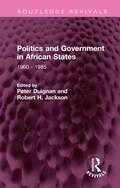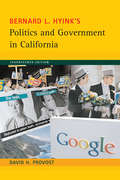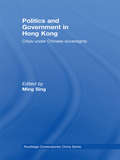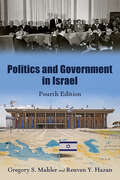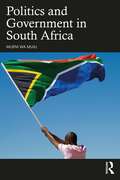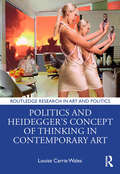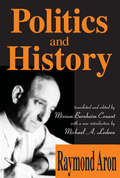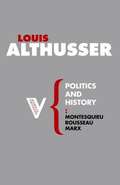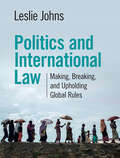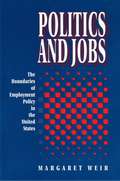- Table View
- List View
Politics and Development: A Critical Introduction
by Olle TörnquistThis major textbook provides a clear and comprehensive introduction to the main analytical approaches and their use in the study of third world politics and development. The author outlines the difficulties in the various analytical approaches to the study of development within political science; presents a critical overview of each of the main schools of thought and explores the contemporary issue of democratization to illustrate how students can apply a framework for research and critically develop a perspective on their own.
Politics and Digital Literature in the Middle East: Perspectives On Online Text And Context
by Nele LenzeDuring the 2000's, online literature in Arabic language was popular among a larger readership. Writings on subjects dealing with politics, globalization, and social matters gained are well-received. While mapping the genre, this monograph shows literary developments in print and digital during these peak years to provide a historical context for the material. Online literary culture is linked to social, economic, and political developments within the last two decades. This book presents the differences between online and print literature as it relates to writer-readership interaction, literary quality, language and style, critical reception, and circulation. The geographic location of the analysis focuses on Gulf countries featuring a comparative study of Egypt and Lebanon.
Politics and Economics in the History of the European Union (The Graz Schumpeter Lectures)
by Alan MilwardThe Graz-Schumpeter annual lectures have grown in reputation over the years with impressive figures from academia such as Ian Steedman, J. Stanley Metcalfe and Duncan K. Foley contributing their own impressive series of lectures. The books produced as a result of these lectures are no less impressive and this latest volume from Alan Milward is a typically authoritative read.
Politics and Economics in the Russian Far East: Changing Ties with Asia-Pacific
by Tsuneo AkahaPolitics and Economics in the Russian Far East addresses the key issue of what the Russian Far East and its Northeast Asian neighbours can do to further closen economic and co-operative relationships. The question of to what extent the state should intervene to stimulate economic growth in the Russian Far East is covered, as are the options for a more laissez-faire approach. The possibilities for economic co-operation with the more successful market economies of the region are discussed as are the problems and opportunities presented by the exploitation of Russia's vast natural resources.This book will be essential reading for all those wishing to obtain a deeper understanding of the complexity of the issues involved in the development of co-operative relationships between Russia and its Asia-Pacific neighbours.
Politics and Education in Argentina, 1946-1962
by Monica ReinThis study focuses on the formal education system in Argentina during the 1940s, the 1950s, and the early 1960s. It analyzes the link between politics and education against the backdrop of changing social conditions in Argentina under the regimes of Peron, Lonardi and Aramburu (the Liberating Revolution), and Frondizi, by evaluating textbooks, official bulletins, childrens' periodicals, speeches, and personal interviews.
Politics and Emotions in Romantic Periodicals
by William Christie Jock Macleod Peter DenneyThis book comprises eleven essays by leading scholars of early nineteenth-century British literature and periodical culture. The collection addresses the many and varied links between politics and the emotions in Romantic periodicals, from the revolutionary decade of the 1790s, to the 1832 Reform Bill. In so doing, it deepens our understanding of the often conflicted relations between politics and feelings, and raises questions relevant to contemporary debates on affect studies and their relation to political criticism. The respective chapters explore both the politics of emotion and the emotional register of political discussion in radical, reformist and conservative periodicals. They are arranged chronologically, covering periodicals from Pigs’ Meat to Blackwood’s Edinburgh Magazine and the Spectator. Recurring themes include the contested place of emotion in radical political discourse; the role of the periodical in mediating action and performance; the changing affective frameworks of cultural politics (especially concerning gender and nation), and the shifting terrain of what constitutes appropriate emotion in public political discourse.
Politics and Expertise: How to Use Science in a Democratic Society
by Zeynep PamukA new model for the relationship between science and democracy that spans policymaking, the funding and conduct of research, and our approach to new technologiesOur ability to act on some of the most pressing issues of our time, from pandemics and climate change to artificial intelligence and nuclear weapons, depends on knowledge provided by scientists and other experts. Meanwhile, contemporary political life is increasingly characterized by problematic responses to expertise, with denials of science on the one hand and complaints about the ignorance of the citizenry on the other.Politics and Expertise offers a new model for the relationship between science and democracy, rooted in the ways in which scientific knowledge and the political context of its use are imperfect. Zeynep Pamuk starts from the fact that science is uncertain, incomplete, and contested, and shows how scientists’ judgments about what is significant and useful shape the agenda and framing of political decisions. The challenge, Pamuk argues, is to ensure that democracies can expose and contest the assumptions and omissions of scientists, instead of choosing between wholesale acceptance or rejection of expertise. To this end, she argues for institutions that support scientific dissent, proposes an adversarial “science court” to facilitate the public scrutiny of science, reimagines structures for funding scientific research, and provocatively suggests restricting research into dangerous new technologies.Through rigorous philosophical analysis and fascinating examples, Politics and Expertise moves the conversation beyond the dichotomy between technocracy and populism and develops a better answer for how to govern and use science democratically.
Politics and Film: The Political Culture of Television and Movies (Second Edition)
by Daniel P. FranklinPolitics and Film examines popular movies and television shows as indicators of social and political trends to explore the political culture of the United States. Updated to include the popular and controversial movies and shows American Sniper, House of Cards, Orange Is the New Black, and Twelve Years a Slave, the second edition investigates popular conceptions of government, the military, intelligence and terrorism, punishment and policing, and recognizes mistakes or dark times in our shared history.
Politics and Force Levels: The Strategic Missile Program of the Kennedy Administration
by Desmond BallThis title is part of UC Press's Voices Revived program, which commemorates University of California Press’s mission to seek out and cultivate the brightest minds and give them voice, reach, and impact. Drawing on a backlist dating to 1893, Voices Revived makes high-quality, peer-reviewed scholarship accessible once again using print-on-demand technology. This title was originally published in 1980.
Politics and Gender Identity in Turkey: Centralised Islam for Socio-Economic Control (Routledge Studies in Middle Eastern Politics)
by Umut Korkut Hande Eslen-ZiyaThe creation of Turkish nationhood, citizenship, economic transformation, the forceful removal of minorities and national homogenisation, gender rights, the position of armed forces in politics, and the political and economic integration of Kurdish minority in Turkish polity have all received major interest in academic and policy debates. The relationship between politics and religion in Turkey, originating from the early years of the Republicanism, has been central to many – if not all – of these issues. This book looks at how centralized religion has turned into a means of controlling and organizing the Turkish polity under the AKP (Justice and Development Party) governments by presenting the results from a study on Turkish hutbes (mosque sermons), analysing how their content relates to gender roles and identities. The book argues that the political domination of a secular state as an agency over religion has not suppressed, but transformed, religion into a political tool for the same agency to organise the polity and the society along its own ideological tenets. It looks at how this domination organises gender roles and identities to engender human capital to serve for a neoliberal economic developmentalism. The book then discusses the limits of this domination, reflecting on how its subjects position themselves between the politico-religious authority and their secular lives. Written in an accessible format, this book provides a fresh perspective on the relationship between religion and politics in the Middle East. More broadly, it also sheds light on global moral politics and illiberalism and why it relates to gender, religion and economics.
Politics and Globalisation: Knowledge, Ethics and Agency (Routledge Advances in International Relations and Global Politics #Vol. 8)
by Martin ShawGlobalisation is widely understood as a set of processes driven by technological, economic and cultural change. Few have successfully defined the changing character and role of politics in global change. Political institutions such as the nation-state have been seen as undermined by globalisation, or needing to respond to it. This book clarifies the tensions which global change has provoked in our understanding of politics. Politics and Globalisation suggests that globalisation is a process which is politically contested and even politically constituted. The volume presents five key intellectual and political contests in globalisation: · the extent and political significance of globalising changes in economy and society · how and how far the relations and forms of nation-state organisation are transformed · whether the given concepts and methods of political science as a discipline can be applied to global and regional politics, and whether they require radical reformulation; · the role and significance of ethical questions in global change · whether global change is constituted by, or denies, radical political agency
Politics and Governance in Indonesia: The Police in the Era of Reformasi (Rethinking Southeast Asia)
by MuradiHow does an authoritarian state reform its police force following a transition to democracy? In 1998, Indonesia, the third largest country in the world, faced just such a challenge. Policing had long been managed under the jurisdiction of the military, as an instrument of the Suharto regime – and with Suharto abruptly removed from office, this was about to change. Here we see how it changed, and how far these changes were for the better. Based on direct observations by a scholar who was involved in the last days of the New Order and who saw how the police responded to regime change, this book examines the police, the new regime, and how the police was disassociated from the military in Indonesia. Providing a comprehensive historical overview of the position of police in this change of regime, the book focuses on two key areas: the differences between local and national levels, and the politicisation associated with decentralisation. Arguing that the disassociation of the Indonesian National Police from the military has achieved only limited success, the book contends that there is continued impetus for the establishment of a professional police force and modern and democratic policing, which will entail effective public control of the police. A pioneering study of the police in Indonesia, examining key issues in the post-Suharto era, this book will be of interest to scholars of Southeast Asian politics and of policing and politics in the developing world.
Politics and Governance in Water Pollution Prevention in China (Politics And Development Of Contemporary China Series)
by Liping DaiThis book applies an interdisciplinary governance assessment framework to assess China’s water quality governance from a holistic point of view. The project explores China’s water quality status, water policy discourses, water regulations, public participation in water governance, the path towards green water law, eco-compensation approach in water quality management and the implementation mechanism for achieving water goals. It will appeal to academics in water law, researchers and practitioners dealing with water management, as well as a general audience interested in water issues.
Politics and Government at Home and Abroad (Routledge Revivals)
by William A. RobsonFirst Published in 1967, Politics and Government at Home and Abroad presents William A. Robson’s penetrating observations on the basic requirements of democratic politics and government. Divided into two parts the essays cover a wide field. Part I deals with the fundamental questions of political thought such as relation between freedom, equality, and socialism; education and democracy, and the basic issues of practical government like reform of the British government; and the future of public administration. Part II of the book brings travelogue essays with author’s reflections on India, America, and Russia. This book is an essential read for students and researchers of political science and public administration.
Politics and Government in African States: 1960 - 1985 (Routledge Revivals)
by Robert H. Jackson Peter DuignanOriginally published in 1986, Politics and Government in African States 1960-1985 deals with the politics of sub-Saharan African states since independence. Each chapter considers the formal structure of government at the time of independence and traces the subsequent changes. Each chapter also describes the development of the state machinery, the civil service, the parastatals, defence and police forces, party structure, the political opposition and trade unions. The economics of African states are dealt with insofar as they affect politics and government.
Politics and Government in California
by Bernard Hyink David ProvostPolitics and Government in California is an even-handed, comprehensive account of the organization and function of California state and local governments.Focusing on how state and local governments can most effectively address the challenges facing California today, the Seventeenth Edition is thoroughly updated to include the most recent data and events.
Politics and Government in Hong Kong: Crisis under Chinese sovereignty (Routledge Contemporary China Series #Vol. 34)
by Ming SingThis book examines the government of Hong Kong since its handover to mainland China in 1997, focusing in particular on the anti-government mass protests and mobilisations in the years since 2003. It argues that Hong Kong has been poorly governed since transferring to Chinese rule, and that public frustration with governmental performance, including anti-subversion laws and slow democratisation, has resulted in the regular and massive protests, which have been rare in Hong Kong's past political development. The book then assesses different explanations for Hong Kong's government problems, including lack of social cohesion, incomplete economic restructuring, structural budgetary deficit, severe social inequality, intensifying cronyism and deficiencies within the political system itself. It goes on to discuss the implications of poor governance for legislative elections, civil society and constitutional development, and considers the prospects for the future. It argues that although in the short-term the Hong Kong government has managed to maintain its popular support ratings, in the longer run it is unlikely to be able to maintain its legitimacy in dealing with the fundamental challenges of government unless the current system is replaced by popular election of the government with appropriate institutional capacity and political powers.
Politics and Government in Israel, Fourth Edition
by Gregory S. Mahler Reuven Y. HazanThis balanced and comprehensive text explores Israeli government and politics from both institutional and behavioral perspectives. After briefly discussing Israel's history, authors Gregory S. Mahler and Reuven Y. Hazan examine the social, religious, economic, cultural, and military contexts within which Israeli politics takes place. They explain the operation of political institutions and behavior in domestic politics, such as the constitutional system; parliamentary government; and the executive, legislative, and judicial machinery of government, including discussion of elections and voting, political parties and civil society, and democracy in Israel. Finally, Israel's foreign policy setting and apparatus are considered, as well as the challenges faced by the Palestinians in Israel and the peace process between Israel and its neighbors. Clear and concise, Politics and Government in Israel provides an invaluable starting point for all readers needing a cogent introduction to Israel today.
Politics and Government in South Africa
by Mueni Wa MuiuPolitics and Government in South Africa introduces readers to all aspects of government and politics in South Africa, from local, to provincial, national, and on to international considerations. The perfect guide for students and general readers, this textbook explains how South Africa’s key institutions are governed and interact with each other, and how important issues such as economics, gender, race, and class shape relations between citizens and government. Grounded in history and leading theories and debates, the book also brings in alternative perspectives from artists, writers, and popular culture, to demonstrate the diverse ways in which issues of politics and social justice are engaged with within South Africa. Written with the needs of students at the forefront, each chapter includes: Review and discussion questions Key terms and further resources Fun facts in a Did you know? section Supplementary sources and quotations in a The Past as Present section Interactive and engaging, Politics and Government in South Africa invites readers to consider what they would do in tackling issues such as land distribution, peacekeeping, South Africa’s role in the African Union, and military engagement abroad. It is an essential read for undergraduate students studying Political Science, International Relations, and African Studies, and for anyone looking to develop a deeper understanding of South Africa.
Politics and Heidegger’s Concept of Thinking in Contemporary Art (Routledge Research in Art and Politics)
by Louise Carrie WalesResponding to Heidegger’s stark warnings concerning the essence of technology, this book demonstrates art’s capacity to emancipate the life-world from globalized technological enframing. Louise Carrie Wales presents the work of five contemporary artists – Martha Rosler, Christian Boltanski, Krzysztof Wodiczko, and collaborators Noorafshan Mirza and Brad Butler – who challenge our thinking and compel a dramatic re-positioning of social norms and hidden beliefs. The through-line is rooted in Heidegger’s question posed at the conclusion of his technology essay as understood through artworks that provides a counter to enframing while using increasingly sophisticated technological methods. The themes are political in nature and continue to have profound resonance in today’s geopolitical climate. The book will be of interest to scholars working in art history, aesthetics, philosophy, and visual culture.
Politics and Heidegger’s Concept of Thinking in Contemporary Art (Routledge Research in Art and Politics)
by Louise Carrie WalesResponding to Heidegger’s stark warnings concerning the essence of technology, this book demonstrates art’s capacity to emancipate the life-world from globalized technological enframing. Louise Carrie Wales presents the work of five contemporary artists – Martha Rosler, Christian Boltanski, Krzysztof Wodiczko, and collaborators Noorafshan Mirza and Brad Butler – who challenge our thinking and compel a dramatic re-positioning of social norms and hidden beliefs. The through-line is rooted in Heidegger’s question posed at the conclusion of his technology essay as understood through artworks that provides a counter to enframing while using increasingly sophisticated technological methods. The themes are political in nature and continue to have profound resonance in today’s geopolitical climate. The book will be of interest to scholars working in art history, aesthetics, philosophy, and visual culture.
Politics and History
by Ron ChristensonRaymond Aron, French scholar, journalist, philosopher, sociologist, and historian, is internationally recognized as one of the great thinkers in the modern social sciences, bringing to contemporary history the insights of both philosophy and social science. This edition focuses on Aron's lifelong attempt to bridge the gap between knowledge and action and to understand the dialectical relationship between history and politics. It is an indispensable introduction to one of the most important thinkers of our century.This volume also contains an introduction by Aron, which presents an autobiographical account of his confrontation with many of the most important ideas of this century. Miriam Bernheim Conant provides perceptive commentary as well as a chronology of Aron's career and works.
Politics and History: Montesquieu, Rousseau, Marx
by Louis Althusser Ben BrewsterIn the first two essays of this book, Louis Althusser analyses the work of two of the greatest thinkers of the Enlightenment – Montesquieu and Rousseau. He shows that although they made considerable advances towards establishing a science of politics, particularly in comparison with the theorists of natural law, they nevertheless remained the victims of the ideologies of their day and class. Montesquieu accepted as given the political notions current in French absolutism; Rousseau attempted to impose by moral conversion an already outdated mode of production. The third essay examines Marx's relationship to Hegel and elaborates on the discussions of this theme in Althusser's earlier books, For Marx and Lenin and Philosophy. Althusser argues that Marx was able to establish a theory of historical materialism and the possibility of a Marxist philosophy of dialectical materialism not simply by turning his back on Hegel, but by extracting and converting certain categories from Hegel's Logic and applying them to English political economy and French socialist political theory.
Politics and International Law: Making, Breaking, and Upholding Global Rules
by Leslie JohnsInternational law shapes nearly every aspect of our lives. It affects the food we eat, the products we buy, the rights we hold, and the wars we fight. Yet international law is often believed to be the exclusive domain of well-heeled professionals with years of legal training. This text uses clear, accessible writing and contemporary political examples to explain where international law comes from, how actors decide whether to follow international law, and how international law is upheld using legal and political tools. Suitable for undergraduate and graduate students, this book is accessible to a wide audience and is written for anyone who wants to understand how global rules shape and transform international politics. Each chapter is framed by a case study that examines a current political issue, such as the bombing of Yemen or the use of chemical weapons in Syria, encouraging students to draw connections between theoretical concepts and real-world situations. The chapters are modular and self-contained, and each is paired with multiple Supplemental Cases: edited and annotated judicial opinions. Accompanied by ready-to-use PowerPoint slides and a testbank for instructors.
Politics and Jobs: The Boundaries of Employment Policy in the United States
by Margaret WeirAmericans claim a strong attachment to the work ethic and regularly profess support for government policies to promote employment. Why, then, have employment policies gained only a tenuous foothold in the United States? To answer this question, Margaret Weir highlights two related elements: the power of ideas in policymaking and the politics of interest formation.
